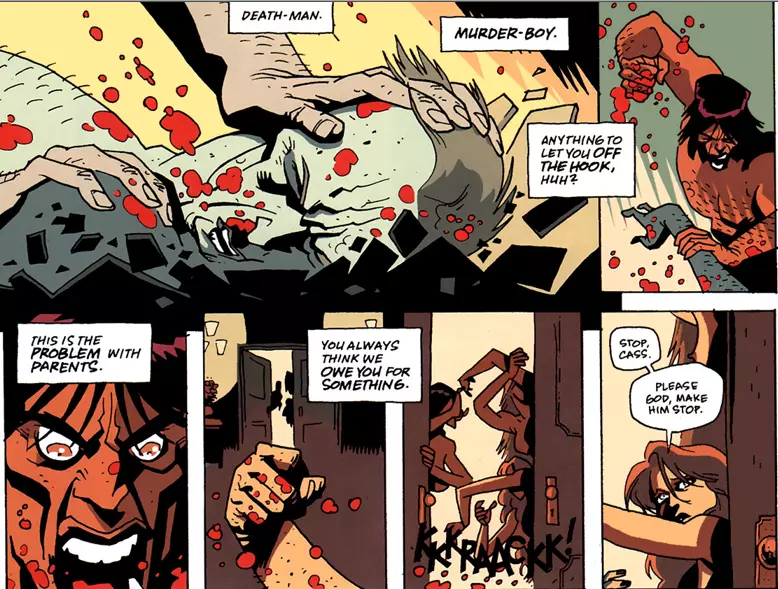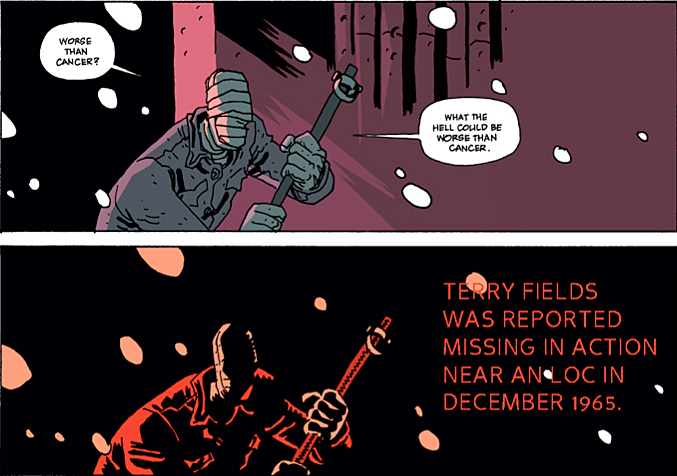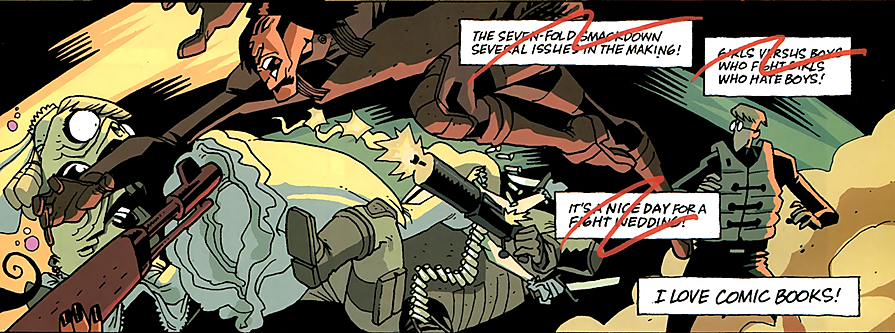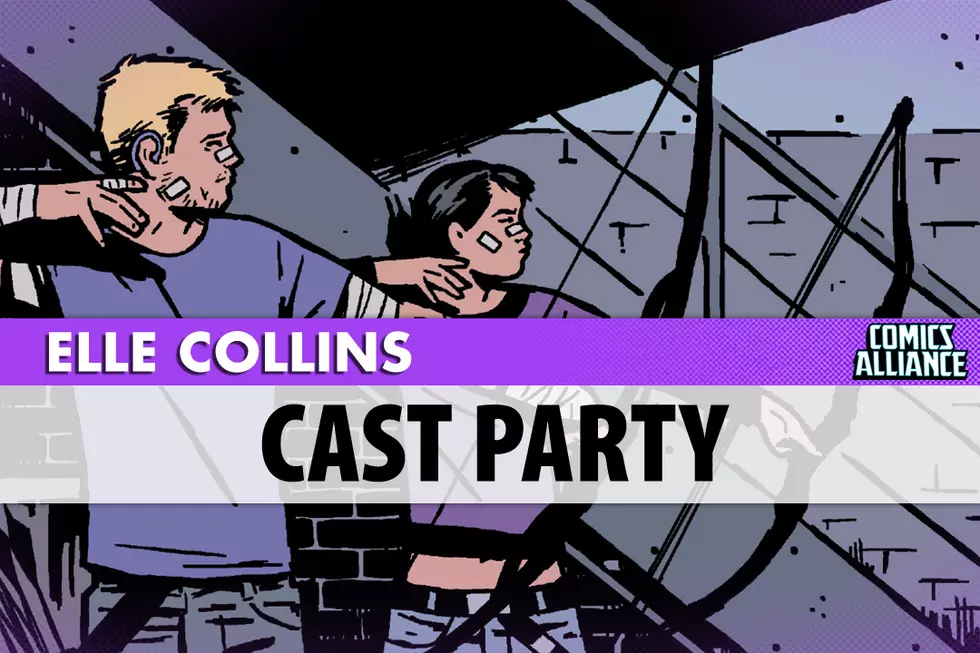![Matt Fraction’s Indie Masterpiece ‘Casanova’ Returns with ‘Avaritia’ [Interview]](http://townsquare.media/site/622/files/2011/09/screen-shot-2011-09-06-at-10.25.00-am.png?w=980&q=75)
Matt Fraction’s Indie Masterpiece ‘Casanova’ Returns with ‘Avaritia’ [Interview]

Casanova is back. Matt Fraction's dimension-tripping superspy comic (alternately illustrated by twin artists Gabriel Ba and Fabio Moon) returns from its lengthy hiatus tomorrow with issue #1 of Avaritia, the third volume now published through the Marvel Comics Icon imprint. First launched in 2006, before Fraction's rise in mainstream comics as the writer of flagship titles like Uncanny X-Men, Thor and Invincible Iron Man, Casanova is a brutally elegant fever dream of science fiction, spy movies and super-heroes, ripped through a hole in space-time specifically to blow your mind. On the cusp of his return to indie comics, Fraction talked to ComicsAlliance about why Casanova is his most personal work, the problem with comic book forums, and why he can spell Odin any way he wants to.
ComicsAlliance: It's been a while between the last volume of Casanova and the new one. How long was the hiatus between issues?
Matt Fraction: It's a gag in the book. [Casanova] actually says how long it has been in the first issue [of Avaritia]. It's been a couple years. It's been a while.
CA: Was it weird to go back?
MF: Well, it was difficult. It was weird in that when I sat down to start writing I reread them all, and came away with the reaction that they weren't so good. Because I was like, this is what made my bones and whatever tiny shred of cred I have left is predicated on these books. So I thought, this will be a positive experience. And it absolutely wasn't.
CA: If you come in with high enough expectations it can be hard for anything to live up to that.
MF: Well, I just wanted adequate. [laughs] So it took me a year to write the [first] issue, because I had to relearn... I think I threw away twice as many script pages as I used. And then something would come out like Bulletproof Coffin, and I'd think, "Oh, I have to start over." So it was this year of continually trying to up my game. And even then there are cases where -- I don't know it was necessarily cryptomnesia, but there was a page that took me forever to come up with, and it made me think, "Oh, aren't I clever. This is smart and what I'm capable of, and isn't this just great. Yay comics!" And then Zack Smith pointed out, "oh yeah, Jim Starlin did that thirty years ago in Warlock, did you mean to homage that?" But I legitimately forgot.
CA: So you had seen it before?
MF: Apparently? I had completely forgotten that I had seen the page and read the page. But yeah, for me and all my big ideas -- they've probably all been done by someone else, better. [laughs] I homage a lot of stuff in Casanova, and I've always worn that on my sleeve, so I think what bugged me was that I had missed it.
CA: You've always said that Casanova is an intensely personal work. Was part of the difficulty coming back related to the things you wanted to work through in the book?
MF: Yeah. Nothing about Casanova has ever been easy... But if it's easy, maybe I'm doing it wrong.

CA: When I reread the first volume and then the new issue, there were a lot of recurring elements, a call and response between the two.
MF: Yeah, yeah. If we get to do all seven volumes there's a design where the first three sort of work as a trilogy, the fourth one stands alone, and then five, six and seven echo that [trilogy]. There's all kinds of symmetry throughout it, very much by design. In the first issue, the first line is "I love my job." And in this volume, the first line is "I hate my job." If you've read the first volume you be able to see the scale of the thing. But if you're coming in for the first time, there's no difference.
CA: In the very first issue of the series we see Casanova at a funeral, and then we open on another funeral in this issue of Avartia. But now he's in an alternate dimension with Xs on his eyes, and everyone he meets is concealed head to toe in bandages so you can't see who they are.
MF: Everybody's wounded... There's a Mountain Goats song, "The Wizard Buys a Hat," that I was listening to, and I saw that opening sequence in my mind. There's a line: "black bandages on my eyes." And I've always liked in Silver Age DC Comics where there are fellas wrapped in bandages for no apparent reason.
CA: Also, in the first issue Casanova punches his father after the funeral, and in Avaritia after the funeral his father punches him.
MF: Really?
CA: Yeah.

MF: Wow. If it makes it up to volume seven, it'll just be annotations. [laughs] I'll just annotate an entire book.
CA: You keep saying "if" the book gets finished. How sure are you?
MF: Absolutely not sure. I'm just covering my bets, but these are uncertain times. Theoretically everyone is committed and everyone wants to do it, but if the numbers drop off suddenly and it becomes a losing proposition for everyone involved, then it makes no sense to go on and tell the story. Everybody wants to do it, but until I have the money and willpower to self-publish it myself and make sure it can come out I'm going to continue to hedge my bets on making any definitive statements. That's why volume seven is going to be all number one [issues].
CA: I hope you're serious. Especially given how much of Casanova is a commentary on comics itself. And in the new issue there's a lot of death --
MF: It's the end of the first act of the story. This volume is about change more than death, but yes, absolutely. This is sort of the end of Casanova's messy birth. The guy he is at the end of this is different than the guy he was at the beginning.
CA: Well, there's the whole thing where the Death card in Tarot means change. All change is the death of something. Casanova as we known him was essentially born when he was torn out of his original dimension, and now he's been tasked with healing the rift that created. Although healing is a weird word to use, because he's essentially committing non-stop genocides.

MF: It's what Lou Reed calls the Sword of Damocles in chemotherapy. To cure you, you have to kill you. [laughs] And then Hulk shows up and punches a guy.
CA: It's interesting you use the word chemotherapy, because we do see actual cancer play a big role in the first issue.
MF: It's all metaphorical. Or it's all literal, one of the two. But no, everything's meant to reflect everything, even the smallest part, especially in this universe. It's a story about twins. The other thing is that there's a sort of bullsh*t commentary that gets thrown at anybody who does personal creator-owned work and mainstream super-hero work, whether it's me or Brubaker or Grant Morrison. "If they wrote commercial book X the way they wrote indie book Y, it'd be great!" Here's the thing: You're not hired to do that. Which I bring up not to criticize the criticism, but to point out that with something like [Casanova] it lets you do things you can't do anywhere else. I'm not paid to write Casanova, so I get to write it however I write it. So that sort of novelist's prerogative of going straight to the patterns or just going super f*cking dark -- you can do. Those those novelistic sort of thing aren't really what people pay for when they show up for X-Men or Thor, you know what I mean? I got enough sh*t just for not having Iron Man in the suit for a few issues. You can't do this sort of stuff in Iron Man, so I do it here, and hopefully do it the best you can do it. And it's great; it lets you exorcise all the things you can't get out anywhere else.
CA: In terms of the metatextual stuff, you deal a lot with fathers and authority figures, and in the first volume of Casanova you have back-to-back stories where Cass is fighting a man who claims to be the writer of Casanova itself and then God. Were they stand-ins for you?
MF: It's a lot of different stuff. It's me clearly dealing with my own issue of authority and issues with anyone who claims responsibility for anyone else's life. My career has a lot of f*cking fathers, and it drives me nuts. I had nothing to do with my own career, apparently, depending on who you to talk to. So it's all that stuff. It's every time someone claims, "You're nothing without me! I made you!" F*ck you, is what that is.

MF: And I had this sort of idea, this short story that I had written about a guy who thought he was not quite Holden Caulfield [of Catcher in the Rye] but a Holden Caulfield type character who sought out and found a reclusive J.D. Salinger-type author. And it was sort of, is this really happening? Is this kid real? Is this the character as Golden Caulfield confronting J.D. Salinger? Is it some deranged lunatic who thinks he is Holden Caulfield? I didn't do it very well, but I liked that notion of a character confronting the author. It's all that sh*t that the whole book is about -- taking responsibility. It's all just meditations on this stuff. Getting into the third book, these patterns and these structures are visible; we're no longer talking about the first hint of [something]. The iris is getting bigger on the whole picture, and hopefully you can see the connections and links that are all kind of presenting themselves as a work.
CA: How much of it is an intentional work versus some David Lynchian subconscious sort of thing where you put it in and then later take a step back and see the pattern that the shapes are making?
MF: I would argue there's no real division. At least in the way I tend to work, there are certainly happy accidents, but you're the one imposing meaning on chaos. You're the one that's saying, "Oh, two twins walked by." You're one who keeps choosing that lens through which to view things. So it's all deliberate, the happy accidents, that sort of neuro-linguistic programming. Like if we talked about the color red, and apples, strawberries and tomatoes, and then a red sports car drives by, you're going to notice the red sports car. You're primed to notice that shade in such a way to allow all that is not your shade to pass through.
CA: In previous volumes you had those talking head moments where the characters spoke directly to the audience, but in the new issue you have panels that are much more third person, revealing things about characters that they don't always know -- their futures, their pasts.
MF: I wanted to figure out how to do a freeze frame in comics. I always liked that in movies, where at the end it tells you what happened to the characters. It's like you get another movie. I like that kind of -- not only is there an all-knowing super narrative in play, I'm going to choose who you get to see and why and when at random, even when they make no sense. Even when they're contradictory within the same page. I wrote it one way, but the way the twins [Gabriel Ba and Fabio Moon] ended up doing it was totally different, much more theatrical. Like it was a stage show and the stage lights dropped down and they're freezing in place on a proscenium. And they made it much better with this treatment where they're in and out of the space, sometimes they're on top of it, sometimes it's on top of them.

CA: There's been a lot of fluidity throughout the series in terms of timelines and what is and isn't the future, but also identity: who people are in terms of their bodies and beyond them. In the same way that Casanova is cutting off these timelines, ending their stories. You have that freeze-frame that talks about what's going to happen to Cass's father, and it felt the same way to me, like cutting something off.
MF: Theoretically. Theoretically, everybody's going to die. We even changed it from the version you've seen so it's even more ambiguous now. But my argument would be that there are these characters, and if they live, then surely they will all die. I love that the producers of Sesame Street had to come out and remind everybody that Bert and Ernie are puppets. And they don't really have sex lives, because they're puppets. You know why warp nacelles can't really go the speed of light? [whispers] Because they're not real.
CA: One of the sentiments that bothers me the most on comic book forums and in comments --
MF: You and I have gotten into this before, but those add nothing of value, except to remind you how repugnant humans are when given anonymity. Make people have to enter in their real name, home address and credit card number, and the quality of comments will increase 800%. Watch how much better your life gets. And listen, Marvel's just come through a heart-breaking couple of weeks. Victorious and heart-breaking at the same time. For every amazing, wonderful response about [new half-black, half-Hispanic Ultimate Spider-Man] Miles Morales, you get one saying "dear [racial slur]-lovers, die." I just don't understand. It's this collision of racism and continuity obsessives. "It's not the real Spider-Man!"
CA: Yeah, that's what I was going to say. I hate this sentiment that somehow people think characters exist without conscious intent of a creator, which I think was best exemplified by that guy who was convinced that Nightrunner was somehow going to be a secret terrorist because he's Muslim. He can't have secrets. Secrets from whom? From the editors? From the people who write him? He's a character; he can't have secrets.
MF: I just did an interview on Fear Itself #5, and it's gone from having questions to being told, now, that Thor wouldn't say "ass." Thor isn't real. My Thor doesn't talk like Stan [Lee]'s Thor and his Thor didn't talk like [J. Michael Straczynzki]'s Thor, and his Thor didn't talk like Walter [Simonson]'s Thor. Everybody's Thor talks differently. Also, being told that Spider-Man wouldn't leave. Spider-Man, who has single-handedly kept the costume-shaped trash can industry afloat in the Marvel Universe. Spider-Man, who has quit numerous times. I've been accused of misspelling the name of a character I made up. I made it up; I can spell it however I want to. I can spell Odin with a "U" if I want to. Bert and Ernie are puppets. One of my favorite parts of Supergods [by Grant Morrison] was that whole thing about how [super-heroes] are legendary. Nobody really lives and nobody really dies. It's all make-believe; it's all stories. And it is. The past is the future, the past is the future. It's time travel.
CA: So is your frustration with commenters --
MF: It's the heartbreak of... The worst thing you can ever do to a cynic is prove him right. Cynics are really just secret romantics that don't want to get hurt again. I don't know how you do [comment moderation]. I literally don't know how you do it.

CA: One of the lines that stuck out to me in the first issue of Avaritia was "f*ck your future, nothing is sacred." Did that come out of encountering this mentality in superhero comics -- this resistance to changes in the characters as fans know them? That's a mentality you could just never have dealing with Casanova because the characters and story are so fluid.
MF: No, it's more like -- well, sure. It's just more about where [Casanova] is now. There's a part in issue #2 that actually takes a place at a comic book convention. Luther Desmond Diamond is a [comic book] writer, and he's meeting someone who asks him about what the previous scene just meant. Then Luther notices that Casanova is waiting in his line, and he gets freaked out and sends his security to move him. Casanova opens fire, and there's a massacre, all kinds of people getting hurt. And I have one line that is absolutely authorial intent inflicted on the text, but then the boys drew [Luther] to looks very much like me. It is impossible not to think it is far more autobiographical than intended. I'm ultimately not comfortable asking [Fabio and Gabriel] to redraw stuff, and I've never asked that. They get the final decision, and I'll make my intent work around that. I've even changed text. But yeah, it's impossible to not read this [scene] as far more autobiographical than I intended it. I sent them the script and I said, this might be too much. This isn't intended to make fun of comic fans, so I told them, please don't make this about fat Optimus Prime [cosplayers] wearing cardboard boxes or whatever. However you draw it, just don't make it mean [to comics fans]. So instead they just made it mean to me. [laughs]

CA: So does Luther -- the character who looks like you -- get shot?
MF: Oh yeah, yeah. He gets wounded but he gets away. So by the end of the first issue [Casanova] figures out who Xeno is, and in the second issue the mission changes from going around and cauterizing timelines to now just going and killing individual Luther Desmond Diamonds. So he doesn't have to kill a trillion people and cauterize an entire universe; he just has to kill one guy before he turns into Hitler. The book becomes about hunting and interacting with Luther Desmond Diamonds, so what happens when Cass decides he actually kind of likes Luther? [Luther] is always some sort of writer, artist, painter, musician. There's always some degree of performance or production involved. So in one of these [universes], he's signing comics at a comic book conventions.
CA: In a certain way, it might be harder to hunt down one person you know over and over again than even destroying an entire universe. The idea of committing genocide instantaneously is so big that I'm not even sure you can comprehend it.
MF: Yeah, it's numbers. It becomes much more one on one and more difficult... This is about Cass taking not just the burden of responsibility but also momentum into his own grasp, freeing himself of debts and and deciding what he wants to do with his life. Some of them are debts he's incurred and some are debts that he's inherited, debts that aren't his to pay, but he's resolving the business of youth. The guy we meet [initially] is...
CA: ...callous?
MF: Maybe callow. I think the problem at the start of [Avaritia], is that he's gone from being callow to absolutely unfeeling, and just spewing the antithesis of "harm none", which becomes "save yourself." Just becoming the most self-contained and terrible monster, far away from the guy we want to hang out with the beginning. He's not a pleasant dude anymore.

CA: He is become death, destroyer of worlds.
MF: Exactly.
CA: At the same time, it's not like he wasn't killing people back at the beginning, back when he loved his job. What makes this different?
MF: It's all about where you choose to focus the lens. What's the difference between Punisher shooting 80 guys from a jet ski in a Carl Potts comics or one guy in a Greg Rucka comic? What has more weight? It depends on what you choose to decide is real, or isn't.
CA: So it's more real to Casanova now?
MF: Well, it's more real to me, because that's what the story is about. It's about awareness of self and the effects you have on everything around you. You can't just run through your life willy-nilly not considering other people. You are not the star of this drama. There is no star. It is by definition an ensemble piece. Once or twice a week I feel compelled to call and apologize to my parents for the way I was as a kid. Being a parent now myself, I understand what they were going through better. Accountability and responsibility for your life -- when you're a kid it never occurs to you. It's about all that stuff.
CA: The book is so kinetic for the first two volumes, moving at a breakneck pace through Cass's adventures, and then you get to the first issue of the new volume and suddenly it gets really recursive. It starts looping around and around back to the same place, and there's this sense of being trapped. Cass never seemed trapped before.
MF: Yeah, day jobs are a motherf*cker sometimes. I want to get him back to a point where, as he says, I love my job. It means something more than it did before. You have to learn to let go of regret. You have to learn to let go of old ghosts. Try this: Make a list of everyone that you resent. Make a list of every single person alive that you still carry resentment for, big and small. Embarrassing things and heartbreaking things, real things and small things. Every single day, spend an hour dwelling on every single resentment -- what are the pies today?
Waitress: I don't think we have pies today.
MF: Son of a b*tch. So you make this list. But here's the thing. It becomes impossible not to feel as though you were running through the streets of Calcutta lugging 800 pieces of luggage. It is such baggage when you sit down and look at all the stuff you've been carrying around in your heart. I'm still hurt and angry at kids from third grade. I am a grown ass man with my f*cking dream job, two healthy and happy children, and healthy and happy marriage that brings me joy, and I am still angry at dudes from third grade. It's not healthy. So it's that story of owning up your sh*t and freeing yourself, because life is so much better when you're not angry at Mikey Palumbo for stealing your f*cking He-Man figure or whatever... In terms of growing up and letting go, it's really not until volumes 4 and 5 that I'm going to have Casanova in the state I wanted him in to tell these stories. It's that amateur mistake you often hear about from people in comics: "I wanna do this comic, but first I have to do this nine-part prequel series that builds the world." And it's sort of bullsh*t. It's not quite that bad, because I don't mind telling the story, but in terms of how I first conceived of the comic and the character, Cass isn't there yet. And this is how he gets to this moment that was my initial conception, which is kind of strange.
CA: Don't you think you needed him to do that, though?
MF: Oh yeah, yeah. Ultimately that story of how you get there... It was interesting to do both year one and year ten as a continuum, as I was kind of going through it. I'm still going through it.

CA: You've talked about the fact that you know how the story ends. To some degree that's projecting for yourself in the future as well, particularly because it does have that personal element to it.
MF: Right. Everybody dies. That's how it's going to end. We all die. [laughs] Just kidding. But I know where I'm going to stop telling his story. I know where he'll be when I'm done telling it. I knew where this story was going to be before I got here, even though I didn't know how I was going to do it. It's that metaphor of a road trip without a road map. We could get in a car right now and drive to Chicago. We could find Chicago.
CA: We could.
MF: We don't know how, but we'll do it. Go east, and figure out what Chicago's going to be like when you get there.
CA: So you knew what Avaritia was going to be like?
MF: I was wrong about what [Avaritia] was going to be like for a year, writing and writing and rewriting.
CA: What were you doing wrong?
MF: You ever hear stories about sculptors and how they can look at a piece of marble and see the sculpture inside, and then they just have to get rid of all the parts around it? It just wasn't right. It didn't move right... I supposed the cardinal sin was that it was boring. Also, I kind of had to get going because the twins [Fabio Moon and Gabriel Ba] were getting ready to draw, so it was forced.
CA: At least taking that time is a luxury you have with Casanova that you don't really have with your Marvel work. Because you don't have a year to find your way into writing a comic.
MF: Yeah, the train's going to leave the station every 28 days and I can either be on it or not, so. That's why we're never going to have a union, because there'll always be someone in the comments who'll do it for free. If you're not going to be on the train in 28 days, they'll find someone who will. You know what happens if I don't send my scripts in? I don't get paid. And I don't have stacks of original art to sell, and no one commissions me to write scripts. I don't get to go to conventions with portfolios of old scripts and sell them for a grand and live off that.

CA: I feel like it's a particularly limiting factor in monthly comics with art, because you see a lot of artists who are really great, but just can't stick to the schedule.
MF: It's like in baseball, the scouts talk about finding a five-tool player. The five things have to do well to make it in professional baseball. One of them is throwing a ball. Pretty basic sh*t. You need to be able to be in one corner of left field, and wing a ball to a cut-off man to complete a play. And if you can't throw the ball from deep left to a second baseman, you're not going to be a professional baseball player. Comics isn't quite like that, because there are all kinds of dudes who can't meet monthly deadlines and still become [professionals]. [Marvel Editor] Tom Brevoort says he has never been involved in an event [comic] of any kind that has ever shipped as planned or been on schedule. Fear Itself is on schedule. When it's done, assuming it comes out when it's supposed to come out, we'll have produced nine months of content in seven months worth of time and shipped it all perfectly. Now, there's plenty of time to f*ck that up, yet, but if we pull that off, it's unheard of. We've dealt with sicknesses, and deaths, and moves, and my computer hasn't worked for a month. Everything great and small you could possibly throw at us, but we just keep moving along. It's a big deal; it's kind of awesome. I hope this happens. With [Fear Itself artist] Stuart [Immonen], it's not just his sense of design and his sense of storytelling. He's a f*cking professional. Stuart has that [ethic] -- finish your work. He delivers excellence on a regular schedule, and that is so rare.
CA: I'm constantly surprised at how rare that seems to be, the ability to deliver and deliver on time. You'd think that would be basic stuff, like you talked about.
MF: There are many bullsh*t fallacies behind Team Comics. No one ever talks about how the heartbreak of independent comics is that all your friends let you down. We never say that out loud. We never come out and say, "You know what's bullsh*t? How my best friend didn't produce work on time." That's the thing. It's a hurtful, painful thing. No one ever talks about that. What happens when you ruin your relationships with all your friends because life gets in the way and you fumble, because doing this much work for free is a motherf*cker. No one comes out and says, "Doing this much work for free is a motherf*cker." You also never say that maybe someone isn't qualified to do something. You've never produced a book on time, but this time you're totally going to be on time! This time for sure! It's like Lucy with the football [in Peanuts].
CA: Did you read Tom Spurgeon's fantastic piece about his recent illness?
MF: I did, I did. And I was going to write him an e-mail, but if I say it to you, will you run it in the article and I'll hope that he reads it and this way I can share my thoughts about Tom with everybody?
CA: Sure.
MF: Get well soon, dummy. Because Jaime [Hernandez] ended Locas, and you wrote 2,000 words about Greg Lantern. Get off the f*cking mat, Tom. And get well.
CA: Get well Tom! But I brought that up because he talked about some of those fallacies too, and I was taken aback how frank he was there, essentially saying, "I don't work as hard as I should. I should work harder." But going back to Casanova for a second, when I look back at the first two volumes, they seem more like crossovers; they're moving between worlds. And when we open on the third volume, it's about destroying worlds -- the sort of world-ending event we see a lot in superhero comics.
MF: I think it becomes more explicit in the third volume that this is a comic about comics. This was the first time that anyone gave me a chance to write, and I as convinced it would never happen again. So I wanted to do and say everything I had to say while I had the chance. I was convinced I would never get past issue #4. In a way, I don't know, saying it anywhere else would have been redundant. It becomes much more explicit when a Casanova comic book becomes a part of Casanova in the second issue [of Avaritia].

MF: I feel like with the end of Fear Itself #7, and moving forward with the Casanova stuff... I've been doing comics as my only source of employment for five years. It's been five years since I quit my last job that didn't have Spider-Man on the check. I feel like that first period was, especially with Fear Itself, everything I had to say about the conversation when I showed up at the party. This next phase -- now I feel like I've been here long enough that I can bring up my own topics in a way that I didn't feel like I could before. It's like... we are all stories, and stories don't have beginnings and ends. Characters don't really live and die. These are continuums that we join and depart from, and can go back and revisit. It's all stories. Everyone dies, be they fictional or real, and the story isn't about, "Oh no, he dies at the end! Spoilers!" All superhero stories are about almost dying. There's no drama if they don't escape. People go to see Houdini not because they want to see Houdini die, but because they want to see him almost die. How do you not die in that situation? How do you get out of it? How do you survive? Superhero fiction, comics books -- they're about getting out of it. The death doesn't matter; it's the escape. That's what Avaritia is about.
More From ComicsAlliance
![Touch Me, Touch Me: The ‘Sex Criminals’ Mixtape [Love & Sex Week]](http://townsquare.media/site/622/files/2017/02/Sex-Criminals-Featured.png?w=980&q=75)



![All The Creator Spotlight Panels To Check Out At San Diego Comic Con [SDCC 2016]](http://townsquare.media/site/622/files/2016/07/Creator-Spotlight-Featured.png?w=980&q=75)




